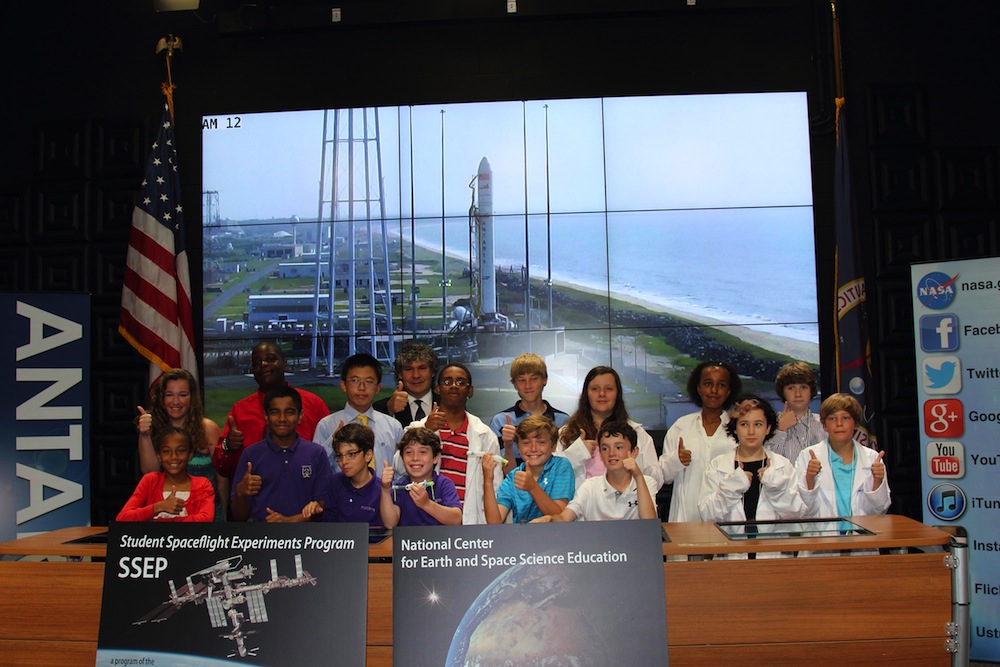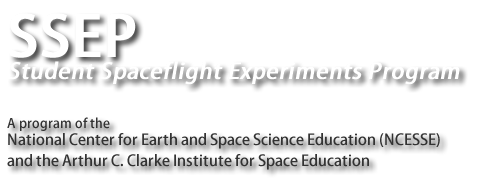
At NASA Wallops Flight Facility, the SSEP briefing to the media on launch day for the Mission 5 Charlie Brown experiments payload, July 13, 2014. In the photo are the SSEP student researcher delegates in attendance. Photocredit: Lloyd Campbell CLICK TO ZOOM
In the world of SSEP spaceflight operations, this is a very BIG week. In fact, we don’t think anything like this has happened before in the history of the program.
At 9:56 am ET, Saturday, October 25, 2014, NASA astronauts Barry Wilmore and Reid Wiseman will release the SpaceX-4 Dragon vehicle from the ISS Harmony module. Aboard Dragon will be the 15 experiments comprising the SSEP Mission 5 Charlie Brown payload. Barry, and ESA astronaut Alexander Gerst, were operating the M5 experiments on Station. Dragon’s de-orbit burn will take place at 2:43 pm ET, with splashdown in the Pacific around 3:39 pm ET.
But ISS will not be SSEP experiment-free for long. Just 2 days later, at launch pad 0-A at the Mid-Atlantic Regional Spaceport, Wallops Island, VA, the Orb-3 Cygnus vehicle atop an Antares rocket will blast off at 6:45 pm ET, Monday, October 27, 2014. Aboard Orb-3 will be the SSEP Mission 6 Yankee Clipper payaload of 18 experiments. In attendance will be 41 SSEP student researchers from 8 SSEP Mission 6 communities. The 8 SSEP delegations total 150 students, teachers, and family members. On launch day, NASA has asked NCESSE to conduct a special SSEP Briefing to the media in the Wallops Visitor Center auditorium, with all student flight teams reporting on their experiments. This is also where the NASA Pre-flight and Mission Briefings take place on the day before launch day.
We wanted to use an appropriate image at the top of this page that could serve as a bridge between the two Missions. Pictured above are the SSEP student researchers at the Mission 5 SSEP Briefing to the media back on launch day for Orb-2, July 13, 2014. It is from a story by Lloyd Campbell, a reporter for RocketSTEM that was at the briefing. After the briefing, Ken Kremer from Universe Today asked all the students to take a group photo at the briefing dais. On the large screen is a live video feed of the rocket on the pad, with SSEP Charlie Brown aboard the Cygnus spacecraft at the top. Framing the photo are the American flag and the NASA flag. Standing proudly in the middle, each with a thumb-ups for we are ‘go’ for launch … are our next generation of scientists and engineers. Pretty powerful stuff.
On Monday, October 27, 2014, it will be the 41 Mission 6 student researchers that Ken will surely ask to take the stage for a group photo.
Given that both of these events are major milestones in the life cycle of both Missions 5 and 6, we want to dedicate a separate blog post to each, and with information on how to tune in live on NASA TV. Stay tuned.
real spaceflight all the time
The Student Spaceflight Experiments Program (SSEP) is a program of the National Center for Earth and Space Science Education (NCESSE) in the U.S., and the Arthur C. Clarke Institute for Space Education internationally. It is enabled through a strategic partnership with NanoRacks LLC, working with NASA under a Space Act Agreement as part of the utilization of the International Space Station as a National Laboratory. SSEP is the first pre-college STEM education program that is both a U.S. national initiative and implemented as an on-orbit commercial space venture.
The Smithsonian National Air and Space Museum, Center for the Advancement of Science in Space (CASIS), and Subaru of America, Inc., are National Partners on the Student Spaceflight Experiments Program.

It is time to celebrate in Tennessee! For the first time in history, Tennessee is sending an experiment to the International Space Station. This amazing STEM program allowed over 300 students at our school to participate in real-world scientific design and research. I am so proud of all my students and their amazing work during this process. As a former International Science Fair Winner, this is far more than a science fair in space. It is a learning opportunity of a lifetime. Every student in this country should have the opportunity to “DO” science. SSEP DOES science!